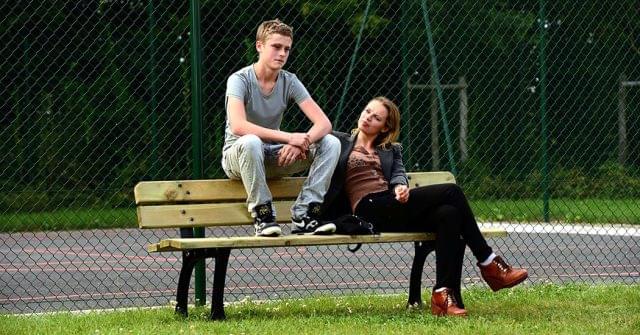
“Standing Tall” (“La Tete Haute”) begins in the office of a French family court judge, where a frazzled, uneducated young mother struggles to explain over the wails of her baby son why her other son, 6-year-old Malony, is such a miscreant at school that the courts had to get involved. But she doesn’t know why he acts this way, and she can’t take it anymore. She leaves the boy in the judge’s office and stomps out, defeated. Malony, who’s been playing quietly in the corner the whole time, looks up at the commotion and sheds a single tear.
Our sympathy for the lad now firmly established, writer-director Emmanuelle Bercot spends much of the next two hours trying to shake it. We jump forward almost ten years to find Malony (Rod Paradot) still as disruptive and violent as earlier reports indicated, only now he’s stealing cars, too. He’s constantly in the judge’s office — not a bad place to be, considering the judge is Catherine Deneuve, but still. His mother (Sara Forestier) wavers between being fiercely defensive of him and saying things like, “I created a monster, like his father.” (Dad’s dead, by the way.) Malony seems beyond repair, but the judge and Malony’s case worker, Yann (Benoit Magimel), refuse to give up on him.
He doesn’t make it easy. In an outstanding performance by then-18-year-old Rod Paradot, Malony is bratty and disaffected, full of unexplained, misdirected anger and unseen wounds. We follow him to a “juvenile rehabilitation facility” (sort of a ranch for wayward boys), where he makes some progress and then undoes most of it with a careless act. That’s his pattern: two steps forward, one step back. One minute he’s showing signs of maturity; the next he’s petulantly insisting that the only job he wants is that of a tattoo artist. Paradot’s beady eyes convey Malony’s hurt, while Deneuve is a reassuring presence as the kind but pragmatic judge who understands it was bad parenting and poor circumstances, not any inherent defect, that made him this way. She urges him to accept help: “Take the hands that are given to you,” she says, in one of the film’s gentler moments.
There are any number of ways that this scenario could have turned into a treacly, faux-inspiring Hollywood drama with a lot of pat answers and feel-good platitudes. Fortunately, Bercot went the other route, delivering a film that is harrowing and hopeful but always humane, with no easy solutions. It shows the cycle of poverty, illiteracy, and indolence that is often passed from one generation to the next, and how difficult it is to break out of it. (Is the ending a happy one? A strong case could be made for either answer.) Granted, if you’ve seen your share of realist social dramas, you won’t find anything here that you haven’t seen before. (It’s strikingly similar to Xavier Dolan’s “Mommy” — bad luck for Bercot, as her perfectly good film pales in comparison to that blast of pure cinema.) But we’re always up for an edifying glimpse into a damaged soul, no matter how familiar the ingredients may be.
B (2 hrs.; French with subtitles; )





